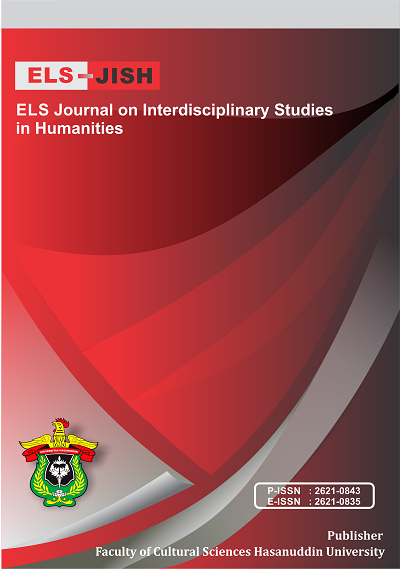Factors Affecting the Effectiveness of Inter-Dialectical Accommodation among the Sellers-Buyers Discourse
DOI:
https://doi.org/10.34050/els-jish.v3i2.10264Keywords:
Accommodation, Convergence, Discourse, inter-dialectal accommodation, Giles Accommodation TheoryAbstract
In this research, the researchers convince the readers about factors that affecting the effectiveness of Inter-dialectical accommodation among sellers-buyers. In this research, they prove how the theory of Giles cannot cover the discourse among sellers and buyers in terms of accommodation, which is done in Central Lombok Nusa Tenggara Barat Province. The researchers describe the phenomenon of the inter-dialectical accommodation in the dialect of Meno-mene versus Meriak-meriku. The object of this research is the activities of sellers-buyers in doing the transaction in the market. The data in this research is taken through observation, recording, interview and note taking of the accommodation among sellers and buyers discourse in some markets in Praya Barat, Praya and Jonggat Sub-district. The researchers use the interpretative qualitative method with some data to reflect the condition of sellers versus buyers discourse in the market. The researchers find the preliminary data shows that the Giles Convergence Theory is un-effective or not applicable in the market where sellers and buyers of Meno-mene versus Meriak-meriku assemble and do a transaction. However, the research result shows the un-effectiveness or there is no effect of converging in bargaining. This research reveals that the convergence theory by Giles cannot be generalized into all part of the discourse, especially in the dialect of Meno-mene versus Meriak-meriku.References
Burgoon, J. (1995). Interpersonal Adaptation Theory
Clark, H. (1996). Using Language. Cambridge: Cambridge University Press
Coupland, N. (2007). Style Language Variation and Identity. Cambridge University Press
Fasold, R. (1984). The Sociolinguistics of Society. Oxford: Blackwell
Fegurson, C. A. (1996). Socio-Linguistic Perspectives: Paper on Language in Society, 1959-1994
Fishman, J. A. (1991). Reversing Language Shift: Theoretical and Empirical Assistance to Threatened Languages. Clevedon: Multilingual Matters.
Fishman, J. (1972). Domains and the relationship between micro-and macrosociolinguistics in John J. Gumperz & Dell Hymes (Eds.) Directions in sociolinguistics: The ethnography of communication, (pp. 435–453), New York, Holt,Rinehart and Winston.
Howard, G., Nikolas, C., Justine, C. (1991). Accommodation Theory: Communication, Context, and Consequence. ICambridge: Cambridge University Press; 1991. pp. 1–68.
Kamwangamalu, N. M. (2003). Social change and language shift, 225–243
Labov, W. (2010). Principles of Linguistic Change. Cognitive and Cultural Factors. Wiley Blackwell. https://doi.org/10.1002/97814443274964
Liliweri, A. (2009). Makna Budaya dalam Komunikasi Antarbudaya. Yogyakarta: LkiS Printing Cemerlang.
Rahman, F. & Letlora, P. S. (2018). Cultural Preservation: Rediscovering the Endangered Oral Tradition of Maluku (A Case Study on Kapata of Central Maluku. Advances in Language and Literary Studies. 9(2). pp. 91 - 97.
Teeuw, A. (1951). Dialect-Atlas van/of Lombok (Indonesia). Djakarta: Biro Reproduksi Djawatan Topografi
West, R & Turner,H,L.(2008). Pengantar Teori Komunikasi: Analisis dan Aplikasi, 3thed. Jakarta: Salemba Humanika
Yasir.(2009).Pengantar ilmu Komunikasi. Pekan Baru: Pusat Pengembangan Pendidikan.
Yasir. (1996b). National Sociolinguistic Profile Formulas in W. Bright (Ed.) Sociolinguistics, 309-315. The Hague: Mputon.
Yasir.(2005).Prasangka dan konflik: Komunikasi Lintas Budaya Masyarakat Multikultur.Yogyakarta: LkiS Pelangi Askara Yogyakarta
Yasir. (1999). Handbook of Language and Ethnic Identity. Oxford. Oxford Univeeristy Press.






